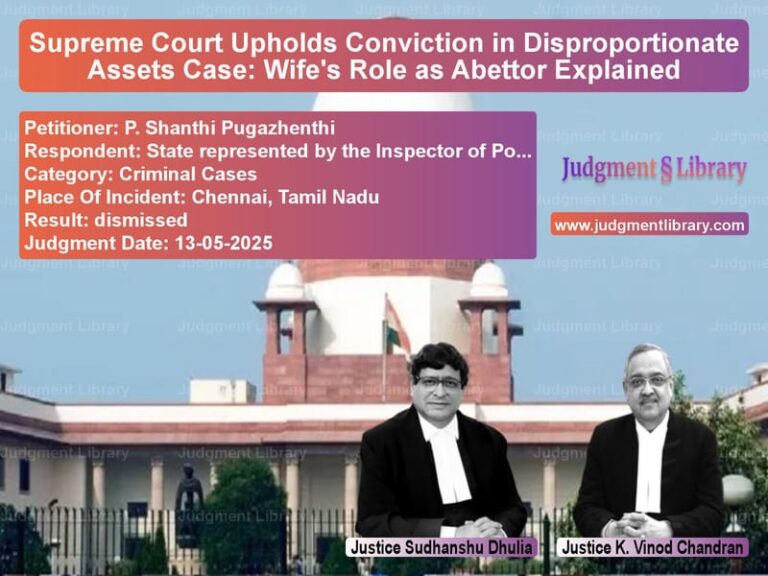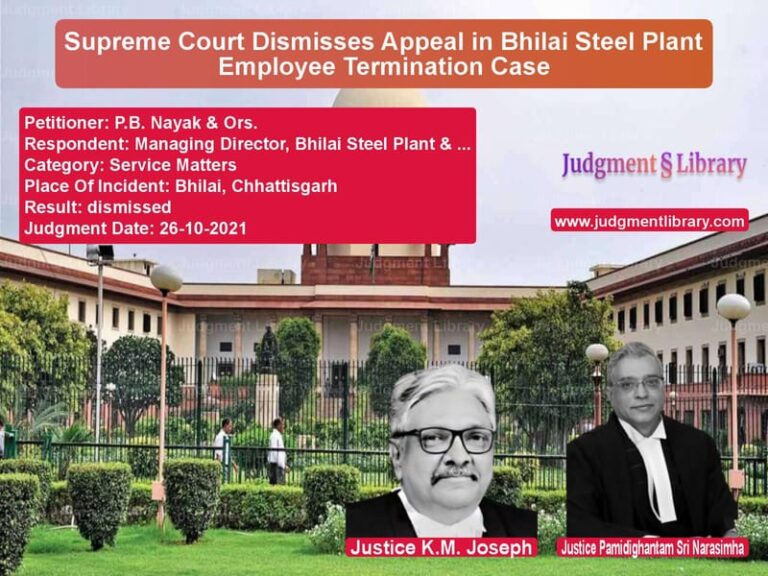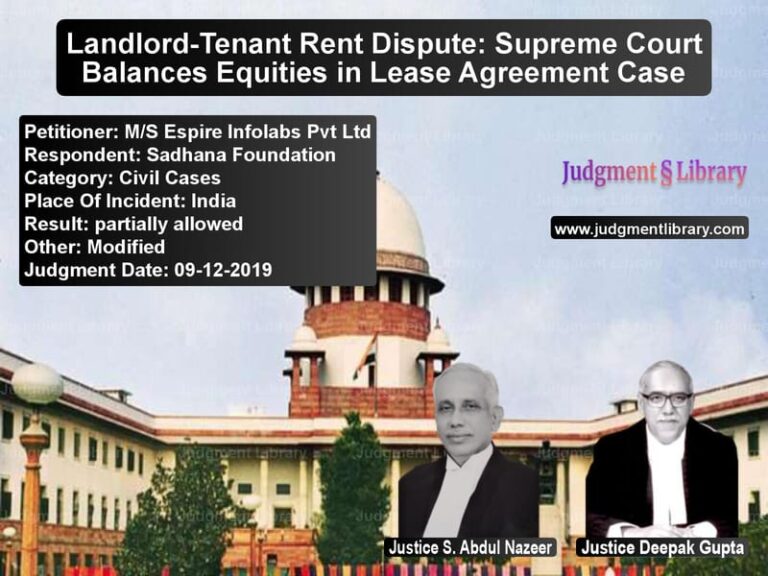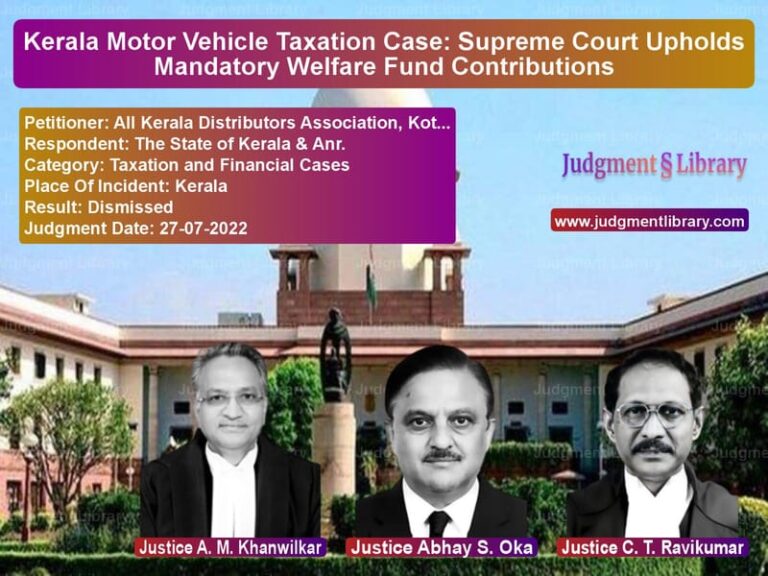Telangana Housing Board Dispute: Supreme Court Orders Transfer of House to Legal Heir
The Supreme Court of India recently ruled in favor of A. Venugopal in a long-standing dispute against the Telangana Housing Board. The case revolved around the denial of house registration despite full payment of installments, due to discrepancies in names appearing on official documents. The Supreme Court overturned the Telangana High Court’s ruling, restoring the order of the Single Judge, and directed the Housing Board to execute and register the deed in favor of the appellant.
This judgment emphasizes the importance of fairness in public housing policies and prevents government agencies from exploiting technical inconsistencies to deny rightful ownership claims.
Background of the Case
The dispute began in 1968 when A. Venugopal’s grandfather, A. Venkaiah, was allotted a house by the then Andhra Pradesh Housing Board on a rental basis. Following his death in 1969, Venugopal’s father, A. Shankaraiah, applied for a transfer of allotment, which was granted in 1970. In 1978, the Housing Board offered the house for outright purchase or a hire-purchase scheme, and Venugopal’s father opted for the latter.
After paying all installments over 14 years, the payment schedule was completed in 1992. However, after the father’s death in the same year, a dispute arose regarding ownership transfer due to minor discrepancies in the names recorded in various documents. The Housing Board repeatedly rejected Venugopal’s application, prompting him to seek legal recourse.
Petitioner’s Arguments
A. Venugopal, represented by his counsel, contended that:
- His grandfather was the original allottee, and his father was legally recognized as the successor by the Housing Board.
- His father had paid all installments under the hire-purchase agreement, and the Housing Board had never questioned his ownership during his lifetime.
- Discrepancies in names were clerical errors and should not be used to deprive a rightful heir of ownership.
- The house had been in his family’s possession for over 50 years, and he had already settled any potential disputes with other family members through a Lok Adalat award.
- The High Court erred in labeling his father a fraudster without evidence, despite decades of peaceful ownership.
Respondents’ Arguments
The Telangana Housing Board, defending its decision, argued that:
- There were inconsistencies in the names recorded in different documents, raising doubts about the legitimacy of the claim.
- The discrepancies suggested a possible attempt to fraudulently claim ownership.
- Despite multiple opportunities, the petitioner failed to rectify the name inconsistencies.
- The Housing Board had the authority to refuse transfer under Sections 52 and 53 of the Telangana Housing Board Act, 1956.
Supreme Court’s Judgment
The Supreme Court, comprising Justices Hemant Gupta and V. Ramasubramanian, ruled in favor of the petitioner, overturning the High Court’s decision. The key observations made by the Court were:
- Longstanding Ownership: The Court noted that the house had remained in possession of the petitioner’s family since 1968 and that the Housing Board had never objected before.
- Clerical Errors Should Not Deny Ownership: The Court emphasized that minor name discrepancies should not be used to deprive a rightful heir of property, especially when the property had been fully paid for.
- Bad Faith by Housing Board: The judgment criticized the Housing Board for attempting to take advantage of technicalities after benefiting from full payment.
- Unfair Accusations by High Court: The Court expressed dismay at the High Court’s conclusion that the petitioner’s father, who died in 1992, had committed fraud, calling it an unreasonable assumption.
- Finality of Legal Proceedings: The Supreme Court directed the Housing Board to register the house in Venugopal’s name within two months.
Implications of the Judgment
This ruling sets an important precedent in housing disputes and government accountability:
- Protection of Legal Heirs: Ensures that legal heirs are not deprived of property due to minor inconsistencies in paperwork.
- Prevention of Government Overreach: Limits the ability of housing boards and government agencies to exploit procedural flaws to deny rightful ownership.
- Recognition of Long-Term Possession: Establishes that peaceful possession for decades strengthens the case for rightful ownership.
- Judicial Scrutiny of Bureaucratic Actions: Reinforces that courts will intervene when government agencies act unfairly or arbitrarily.
Conclusion
The Supreme Court’s ruling in A. Venugopal vs. Telangana Housing Board upholds the principles of fairness and natural justice in property disputes. By preventing a government agency from using technical inconsistencies to deny a rightful claim, the judgment ensures that public housing policies remain transparent and just. This decision sets a strong precedent for similar cases, reinforcing the judiciary’s role in protecting citizens’ rights against bureaucratic overreach.
Petitioner Name: A. Venugopal.Respondent Name: Telangana Housing Board & Anr..Judgment By: Justice Hemant Gupta, Justice V. Ramasubramanian.Place Of Incident: Telangana.Judgment Date: 04-04-2022.
Don’t miss out on the full details! Download the complete judgment in PDF format below and gain valuable insights instantly!
Download Judgment: a.-venugopal-vs-telangana-housing-bo-supreme-court-of-india-judgment-dated-04-04-2022.pdf
Directly Download Judgment: Directly download this Judgment
See all petitions in Property Disputes
See all petitions in Landlord-Tenant Disputes
See all petitions in Specific Performance
See all petitions in Judgment by Hemant Gupta
See all petitions in Judgment by V. Ramasubramanian
See all petitions in allowed
See all petitions in supreme court of India judgments April 2022
See all petitions in 2022 judgments
See all posts in Civil Cases Category
See all allowed petitions in Civil Cases Category
See all Dismissed petitions in Civil Cases Category
See all partially allowed petitions in Civil Cases Category







